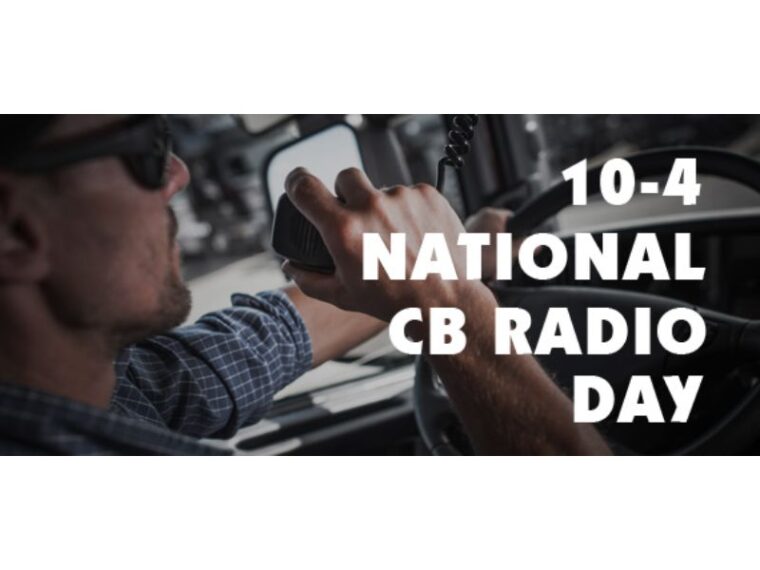Today is a special day for Citizens Band enthusiasts. It’s National CB Radio Day! On October 2, 1978, President Jimmy Carter issued a statement proclaiming October 4 (10-4) as National CB Radio Day.
He acknowledged the use of CB radio for emergency communications both on and off the road and noted that the use of radio enabled citizens to actively participate in the enhancement of public safety.
- Carter said, “While CB is primarily for emergency use, the non-emergency channels bring enjoyment and companionship to millions of Americans”
- Carter said, “including my own family.”
Carter’s family was not the “first” First Family exposed to the Citizens Band craze of that era. First Lady Betty Ford was also reportedly an avid CB radio operator. Her CB “handle” was “First Mama”. Have you ever been communicating over two-way digital radio and heard radio lingo that had you scratching your head?
No products found.
Say you finished saying something important and the person you were speaking to responded “10-4,” or “Roger that.” Maybe they even replied with a “Sure, what’s your 20?” when you talked about meeting up.
These phrases are examples of short-hand radio that’s been in place for decades, all designed to create succinct and crystal clear communications for radio users. Unfortunately, things aren’t that clear when you aren’t familiar with the terminology. To help you understand some of the most popular radio lingo used today, we broke it down here. Over.
There are certain radio terms that are likely already familiar to radio and non-radio users alike because of their prevalence in popular culture, from police radio codes on TV to CB radio in songs and movies.
Here are some of the terms that will most likely ring a bell even if you’re brand new to radio communications.
- Roger That : A quick way to say that you understand what the other person is saying. “Roger” stems from the days of Morse code communications when the letter “R” was used to indicate “received” or “message understood.” As radio communications became more popular and the technology evolved, the U.S. military adopted the term “roger” for the same reason.
- Mayday : A term that you will hopefully only ever encounter in the movies and not in real life. It essentially means “life-threatening emergency” and is recognized internationally as a universal distress signal. Most often, “mayday” is used to indicate that a vehicle or transport, such as a plane, boat, helicopter, etc., is going down. The term dates back to the early 1920s and is derived from a French word m’aidez, which means “come help me.”
- Over : Used at the end of a sentence or phrase to indicate that the person is done speaking.
- Out : Indicates that the person is signing off.
- Read/Copy : Both words are used to ask if the speaker is being heard or understood, for instance, “Do you read me?” or “Do you copy?” Think of it as the digital radio version of “Can you hear me now?”
- Wilco : Literally means “will comply” and indicates that the speaker is intending to complete the task that’s been asked of them.
- Use Of CB Radio
CB radio is still used by truckers today and continues to evolve. Here are some of the most common rated examples of CB radio (remember that we said it was colorful).
- Advertising : a marked police car with its lights flashing
- Bear/Smokey : police officer; refers to the fact that the Smokey Bear character created by the Ad Council wears a hat similar to those of many highway patrol officers.
- Camera : police radar unit
- City Kitty : local police officer
- County Mounty : county sheriff or deputy
- Evel Knievel : police officer on a motorcycle; named for the motorcycle stuntman.
- Big D : Dallas
- Derby City : Louisville, Kentucky
- Mardi Gras : New Orleans
- Mickey Mouse : Orlando, Florida
- Windy City : Chicago
- Alligator/Gator : large piece of blown-out tire on the road
- Go-go Juice : gasoline or diesel fuel
- Nap Trap : hotel or rest stop
- Bulldog : Mack road tractor
- Four-wheeler : any vehicle with only 2 axles; anything that isn’t an 18-wheeler/semi truck
- Kiddie car : School bus
- Pete/Peter Car : Peterbilt truck
- Salt Shaker : snow plow
The 10-Codes
10-codes provide a succinct way of communicating via radio that spans users and industries. You’re just as likely to hear a 10-code working in the public safety arena as you are in a manufacturing company.
In short, 10-codes (or 10-signals) are numbers that stand in for phrases. Here are some of the most popular 10-codes and what they mean:
- 10-1 : Bad reception
- 10-4 : “OK” or “Affirmative,” similar to “roger”
- 10-9 : “Say again”, or “repeat, please”
- 10-20 : Location, as in “What’s your 20?”
- 10-36 : Current time, “Can I get a 10-36?”
- 10-69 : “Message received,” again, much like “roger”
- 10-77 : Estimated time of arrival, “Alpha 10-77”

